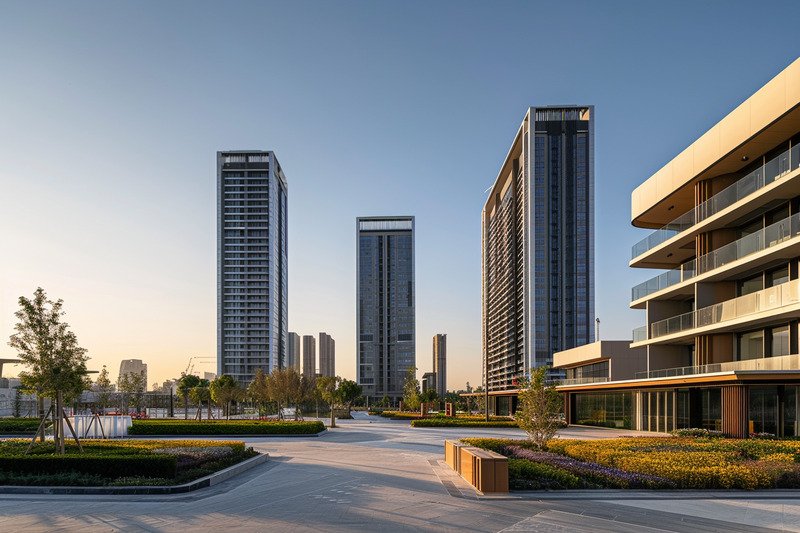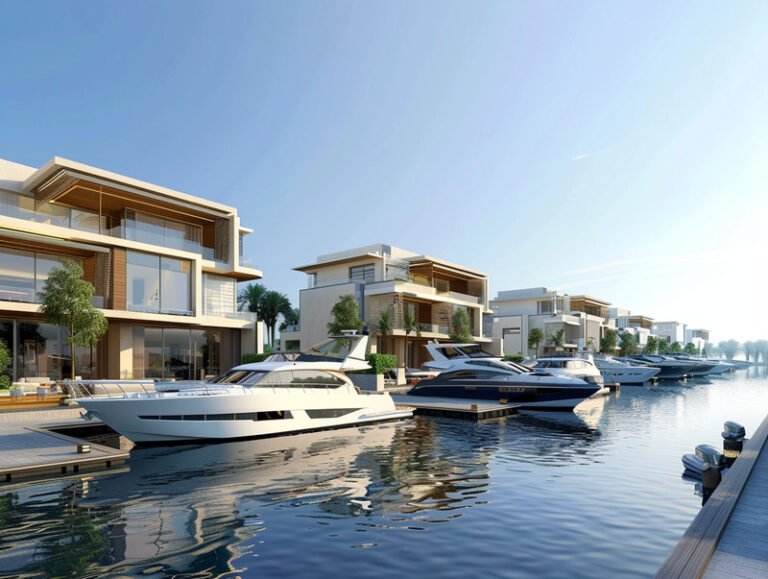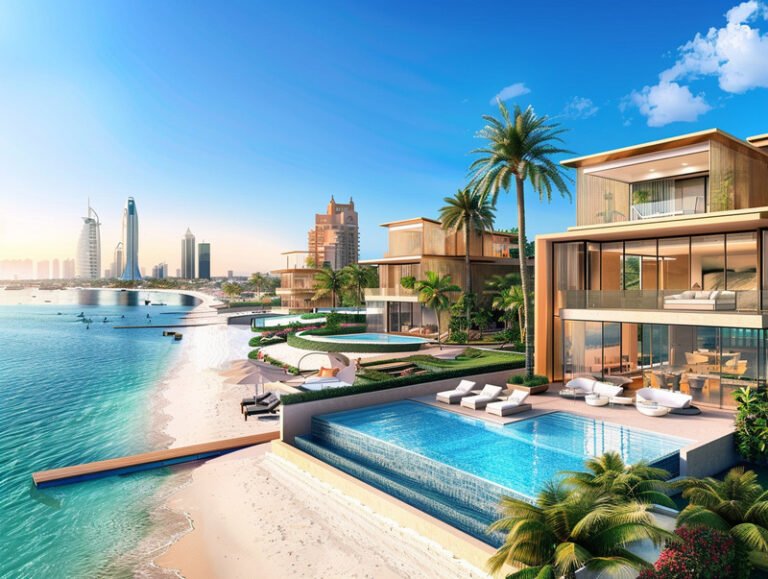Information on Down Payment Requirements

When considering buying property in Dubai, understanding the down payment requirements is crucial. Typically, expats need a 20% down payment, while UAE nationals might need only 15%. The down payment amount influences your borrowing power and monthly payments.
How do you determine the best down payment strategy for your situation? Let’s explore the options and what they mean for you.
- For expats, a 20% down payment is standard. This means if you’re eyeing a property worth AED 1 million, you’ll need AED 200,000 upfront.
- UAE nationals have a slight advantage, requiring just 15%. For the same property, this would be AED 150,000.
- A higher down payment can lower your monthly payments and reduce the overall loan term.
Consider your financial situation, future plans, and market conditions to decide the best strategy.
Understanding these requirements helps you plan better and make informed decisions in Dubai’s dynamic real estate market.
Let us help you find the perfect property. Contact us to get started.
Understanding Down Payments
- Understanding down payments in Dubai real estate starts with knowing their impact on your home-buying process and financial health.
- A down payment is the initial sum you pay when purchasing property. It represents a percentage of the home’s price and affects your mortgage size.
- A larger down payment reduces the amount you need to borrow. This lowers your monthly mortgage payments and total interest over the loan’s life.
- Putting more money down can also help you secure better interest rates. In Dubai, a down payment of at least 20% is often required to avoid private mortgage insurance (PMI).
- A substantial down payment shows lenders you’re a lower-risk borrower. This simplifies loan approval.
- Planning and discipline are essential for saving a down payment, but the long-term benefits are significant.
- Assess your financial situation, including savings, income, and expenses. This helps determine how much you can afford to put down.
Conventional Loan Requirements
When you’ve saved up a substantial down payment, it’s time to explore the specific requirements for securing a conventional loan in Dubai. Conventional loans in Dubai aren’t insured by the government, making them different from FHA loans.
- Typically, for a conventional loan, you’ll need a down payment of at least 20% of the property’s purchase price. Some lenders in Dubai may accept as little as 10% under certain conditions.
- Your credit score plays a significant role. A higher score, generally above 700, increases your chances of securing favorable terms.
- Lenders will also scrutinize your debt-to-income ratio (DTI). Ideally, your DTI shouldn’t exceed 36%. Some lenders may allow up to 45% based on other financial strengths.
- Proof of stable income and employment history is essential. You’ll need to provide recent pay stubs, tax returns, and possibly a letter from your employer.
- Lenders will assess your overall financial health, including existing debts and assets. A lower loan-to-value ratio (LTV) can make your application more attractive.
FHA Loan Requirements
If you’re contemplating an FHA loan for real estate in Dubai, you’ll find these government-backed loans usually require a lower down payment than traditional loans.
- Generally, a 3.5% down payment is needed if your credit score is 580 or higher. For credit scores between 500 and 579, a 10% down payment is required.
- FHA loans aim to enhance homeownership accessibility. Lenders typically expect your monthly mortgage payment to be no more than 31% of your gross monthly income. Additionally, your total monthly debt, including the mortgage, shouldn’t exceed 43% of your gross monthly income.
- Mortgage insurance premiums (MIP) are also a part of FHA loans. You’ll pay an initial MIP at closing and annual premiums divided into monthly installments. This insurance protects the lender if you default on the loan.
- FHA loans can be a practical choice for reducing your initial financial outlay.
VA and USDA Loans
- VA and USDA loans offer appealing options for Dubai homebuyers seeking minimal or no down payment requirements.
- For veterans or active-duty service members, a VA loan can be a fantastic choice. Overseen by the Department of Veterans Affairs, these loans often allow you to purchase a home without any down payment and typically don’t necessitate private mortgage insurance (PMI).
- USDA loans are designed for those interested in rural and suburban Dubai properties. The United States Department of Agriculture offers these loans to encourage homeownership in less densely populated regions.
- Like VA loans, USDA loans frequently don’t require any down payment, making them ideal for buyers not wanting a significant initial investment.
- Both VA and USDA loans come with specific eligibility criteria, so it’s vital to verify if you qualify before applying. These loans might also offer lower interest rates compared to traditional loans, adding to their appeal.
Credit Score Impact
In Dubai, your credit score significantly impacts your ability to secure favorable mortgage terms. A higher score can lower your down payment and interest rates.
- Typically, a score of 620 or higher is good, but a score above 740 can unlock the best rates and terms.
- Lenders assess your financial reliability using your credit score. If your score is lower, expect higher down payment demands and interest rates. For example, FHA loans require a minimum down payment of 3.5% if your score is at least 580. Scores between 500 and 579 require a 10% down payment.
- Improving your credit score before applying for a mortgage in Dubai can save you thousands over the loan’s life.
- Pay bills on time, reduce debt, and correct any inaccuracies on your credit report.
- A higher score signals lower risk to lenders, making your home purchase more affordable and stress-free.
Tips for Saving
Saving for a down payment on a property in Dubai can seem challenging, but with strategic planning, it becomes manageable and rewarding.
- Start by creating a dedicated savings account specifically for your down payment. This helps you track your progress and prevents you from using these funds for other expenses.
- Automate your savings by setting up a direct deposit from your paycheck into this account, ensuring consistent contributions.
- Review your monthly budget to identify areas where you can cut back. Small adjustments, like reducing dining out or canceling unnecessary subscriptions, add up over time. Set specific savings goals and timelines to stay motivated and accountable.
- Look for ways to increase your income. Consider taking on a part-time job, freelancing, or selling items you no longer need. Every extra dirham you earn brings you closer to your down payment goal.
- Take advantage of any employer-sponsored savings programs or bonuses. Some companies in Dubai offer matched savings plans or annual bonuses that can significantly boost your savings.
Common Myths Debunked
Many misconceptions about down payment requirements can hinder your home-buying journey in Dubai. It’s crucial to separate fact from fiction to make informed decisions. Here are some common myths debunked:
- Myth: You need a 20% down paymentReality: While a 20% down payment offers benefits like lower interest rates, it’s not always necessary. Depending on your lender and financial profile, you might secure a home loan with as little as 5-10%.
- Myth: Only first-time buyers get down payment assistanceReality: Various programs offer down payment assistance, not exclusively for first-time buyers. Eligibility often depends on factors like income, property location, and buyer status.
- Myth: You must use your savings for the down paymentReality: Besides personal savings, you can use gifts from family, grants, or loans from retirement accounts for your down payment. However, make sure these sources comply with lender requirements.
- Myth: Higher down payments guarantee loan approvalReality: While a larger down payment improves your loan application, approval also relies on your credit score, debt-to-income ratio, and employment history. Lenders evaluate your overall financial health.
Clarifying these myths can help you navigate the home-buying process in Dubai more effectively.
Conclusion
To sum up, understanding down payments is essential when buying property in Dubai.
- Conventional loans here usually require a 20% down payment.
- First-time buyers might need a minimum of 25%, while non-residents often face higher percentages.
- Your down payment influences your borrowing amount, monthly payments, and loan terms.
- Assess your financial situation carefully and explore all options to find the best fit for your needs.
“`
Let us help you find the perfect property. Contact us to get started.






